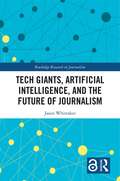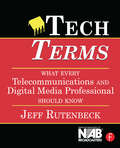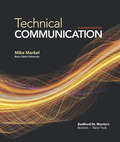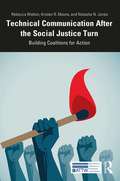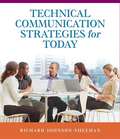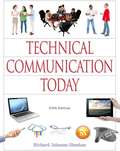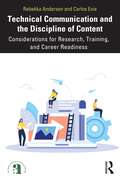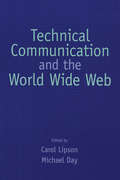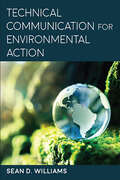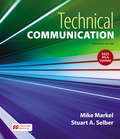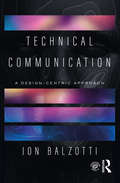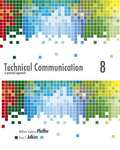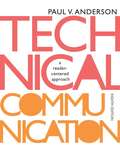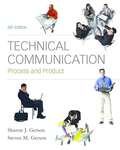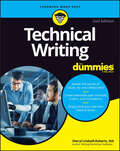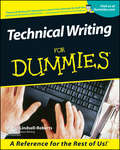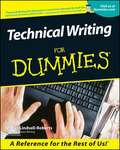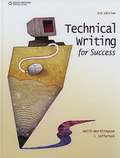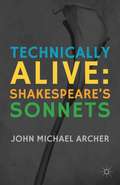- Table View
- List View
Tech Giants, Artificial Intelligence, and the Future of Journalism (Routledge Research in Journalism)
by Jason Paul WhittakerThis book examines the impact of the "Big Five" technology companies – Apple, Alphabet/Google, Amazon, Facebook and Microsoft – on journalism and the media industries. It looks at the current role of algorithms and artificial intelligence in curating how we consume media and their increasing influence on the production of the news. Exploring the changes that the technology industry and automation have made in the past decade to the production, distribution and consumption of news globally, the book considers what happens to journalism once it is produced and enters the media ecosystems of the internet tech giants – and the impact of social media and AI on such things as fake news in the post-truth age. The audience for this book are students and researchers working in the field of digital media, and journalism studies or media studies more generally. It will also be useful to those who are looking for extended case studies of the role taken by tech giants such as Facebook and Google in the fake news scandal, or the role of Jeff Bezos in transforming The Washington Post. The Open Access version of this book, available at https://doi.org/10.4324/9781351013758, has been made available under a Creative Commons Attribution-Non Commercial-No Derivatives 4.0 license.
Tech Terms: What Every Telecommunications and Digital Media Professional Should Know
by Jeff RutenbeckAn avalanche of acronyms, terms-of-art, buzz words, and short-hand phraseology confronts today's busy communications professionals. Now in its 3rd edition, Tech Terms is an invaluable learning tool to help grasp key aspects of the television and video, PC hardware and software markets, multimedia authoring tools, and the exploding wireless Internet and mobile telecomputing worlds. With more than 1000 terms described in four sentences or less, Tech Terms is perfect the perfect desk reference.
Technical Communication
by Mike MarkelInstructors know that Mike Markel's Technical Communication will prepare their students for any workplace writing situation. No other text offers such a comprehensive introduction to the field while still delivering practical, effective support for students at every level. The eleventh edition has been thoroughly revised to reframe the work of technical communicators in the context of today's highly collaborative, rapidly evolving digital practices. Fresh, social-media driven sample documents and coverage of the latest tools and technologies ensure that students work with the kinds of processes and products they'll encounter on the job.
Technical Communication After the Social Justice Turn: Building Coalitions for Action (ATTW Series in Technical and Professional Communication)
by Rebecca Walton Kristen Moore Natasha JonesThis is the first scholarly monograph marking the social justice turn in technical and professional communication (TPC). Social justice often draws attention to structural oppression, but to enact social justice as technical communicators, first, we must be able to trace daily practice to the oppressive structures it professionalizes, codifies, and normalizes. Technical Communication After the Social Justice Turn moves readers from conceptual explorations of oppression and justice to a theoretical framework that allows for the concepts to be applied and implemented in a variety of practical contexts. It historicizes the recent social justice turn in TPC scholarship, models a social justice approach to building theories and heuristics, and presents scenarios that illustrate how to develop sustainable practices of activism and social justice. Its commitment to coalition building, inclusivity, and socially just practices of citation and activism will support scholars, teachers, and practitioners not only in understanding how the work of technical communication is often complicit in oppression but also in recognizing, revealing, rejecting, and replacing oppressive practices.
Technical Communication Strategies for Today
by Richard Johnson-SheehanTechnical Communication Strategies for Today offers students all of the topics and genres they need for their technical communication course. Students want their textbooks to cost less, and they want comprehensive topical coverage presented in a succinct and clear writing style. Technical Communication Strategies for Today offers both and speaks to today's students. Instructional narrative is "chunked," so that portions of text are combined with graphics. The chunked presentation also integrates an awareness of how documents are read-often skimmed by readers seeking the information they need, and it models the way today's technical documents should be designed. The contemporary writing style is matched by an approach that accurately reflects the modern day computer-centered technical workplace: Technical Communication Strategies for Today presents computers as thinking tools that powerfully influence how we develop, produce, design, and deliver technical documents and presentations.
Technical Communication Today (Fifth Edition)
by Richard Johnson-SheehanTechnical Communication Today was written for introduction to technical communication or technical writing courses taught most often in English Departments. Technical Communication Today remains the only text to fully centralize the computer in the technical workplace, presenting how writers use computers throughout their communication process. Writers use their computers to help them think, research, compose, design, and edit. Not only is Technical Communication Today firmly rooted in core rhetorical principles, but the text also presents computers as thinking tools that powerfully influence how we develop, produce, design, and deliver technical documents and presentations. Technical Communication Today speaks to today's students and how they expect to learn information. Instructional narrative is "chunked," so that readable portions of text are combined with graphics. This presentation facilitate learning, and models the way today's technical documents should be designed. Additionally, the chunked presentation integrates an awareness of how documents are read--often "raided" by readers seeking the information they need. By mirroring these processes in its content and structure, Technical Communication Today offers readers a higher level of accessibility.
Technical Communication and the Discipline of Content: Considerations for Research, Training, and Career Readiness (ATTW Series in Technical and Professional Communication)
by Carlos Evia Rebekka AndersenThis book explores how workflows and technologies that treat content as computable data are changing the roles, work activities, and outputs of professional technical communicators.It describes how the need for disciplinary approaches to design, manage, and deliver content has given rise to “the discipline of content” – content strategy, content design, content engineering, content operations – that increasingly defines a facet of technical communication work in modern organizations. This book draws on extensive research of the discipline of content and dozens of interviews with industry leaders, hiring managers, and academic administrators, educators, and alumni. These first-hand accounts outline how roles and activities in content organizations are changing, how these changes are impacting hiring needs and practices, and what skills and qualities students and early-career professionals now need to obtain content-related jobs and advance to strategic positions. This book also offers guidance for building curricular pathways that prepare students for work in the discipline of content and offers strategies for enhancing pathways through industry outreach and partnerships.A thorough assessment of the implications of the discipline of content for technical communication, this book will be of interest to students and scholars in the fields of technical writing, professional and public writing, content strategy, content marketing and information design.
Technical Communication and the World Wide Web
by Michael Day Carol LipsonOver the past decade, the World Wide Web has dramatically changed the face of technical communication, but the teaching of writing has thus far altered very little to accommodate this rapidly changing context. Technical Communication and the World Wide Web offers substantial and broadly applicable strategies for teaching global communication issues affecting writing for the World Wide Web.Editors Carol Lipson and Michael Day have brought together an exceptional group of experienced and well-known teacher-scholars to develop this unique volume addressing technical communication education. The chapters here focus specifically on curriculum issues and the teaching of technical writing for the World Wide Web, contributing a blend of theory and practice in proposing changes in curriculum and pedagogy. Contributors offer classroom examples that teachers at all levels of experience can adapt for their own classes. The volume provides comprehensive coverage of the technical communication curriculum, from the two-year level to the graduate level; from service courses to degree programs.This volume is an important and indispensable resource for technical writing educators, and it will serve as an essential reference for curriculum and pedagogy development in technical communication programs.
Technical Communication for Environmental Action (SUNY series, Studies in Technical Communication)
by Sean D. WilliamsClimate change is one of the most significant challenges facing the global community in the twenty-first century. With its position at the border of people, technology, science, and communication, technical communication has a significant role to play in helping to solve these complex environmental problems. This collection of essays engages scholars and practitioners in a conversation about how the field has contributed to pragmatic and democratic action to address climate change. Compared to most prior work—which offers theoretical perspectives of environmental communication—this collection explores the actual practice of international technical communicators who participate in government projects, corporate processes, nonprofit programs, and international agency work, demonstrating how technical communication theories such as participatory design, social justice, and ethics can help shape pragmatic environmental action.br>SUNY Press has collaborated with Knowledge Unlatched to unlock KU Focus Collection titles. The Knowledge Unlatched titles have been made open access through libraries coming together to crowd fund the publication cost. Each monograph has been released as open access making the eBook freely available to readers worldwide. Discover more about the Knowledge Unlatched program here: https://www.knowledgeunlatched.org/. It can also be found in the SUNY Open Access Repository at <a href="https://soar.suny.edu/handle/20.500.12648/8482 ">https://soar.suny.edu/handle/20.500.12648/8482 .
Technical Communication with 2021 MLA Update
by Stuart A. Selber Mike MarkelThis ebook has been updated to provide you with the latest guidance on documenting sources in MLA style and follows the guidelines set forth in the MLA Handbook, 9th edition (April 2021).Make the leap from writing in college to writing in a variety of workplace settings and contexts with Technical Communication. Practical advice and real-world examples let you practice with the kinds of writing processes and products you’ll encounter on the job.
Technical Communication: A Design-Centric Approach
by Jon BalzottiTechnical Communication: A Design-Centric Approach is a comprehensive textbook for introductory courses in technical communication and professional writing. Technical Communication takes a design approach to foundational and emergent technical communication skills such as document design, job applications and interviews, workplace collaboration, and report writing, providing students with practical guidance on matters of ethics, style, and problem-solving in a range of professional and organizational contexts. This is a core textbook suitable for undergraduate courses in technical and professional communication. The book is supplemented by an innovative website featuring interactive simulations of various real-world technical communication challenges. Visit https://microcore.byu.edu/
Technical Communication: A Design-Centric Approach
by Jon BalzottiTechnical Communication: A Design-Centric Approach is a comprehensive textbook for introductory courses in technical communication and professional writing. Technical Communication takes a design approach to foundational and emergent technical communication skills such as document design, job applications and interviews, workplace collaboration, and report writing, providing students with practical guidance on matters of ethics, style, and problem-solving in a range of professional and organizational contexts. This is a core textbook suitable for undergraduate courses in technical and professional communication.The book is supplemented by an innovative website featuring interactive simulations of various real-world technical communication challenges. Visit https://microcore.byu.edu/
Technical Communication: A Guided Approach
by June Dostal Deborah St VincentStudents practice as they learn to utilize and refine their reading, writing, listening, and speaking skills. They also learn how to write business documents, develop editing skills, practice teamwork, solve problems, develop a portfolio, use leadership skills, and learn to interact with other people.
Technical Communication: A Guided Approach
by June Dostal Deborah St VincentStudents practice as they learn to utilize and refine their reading, writing, listening, and speaking skills. They also learn how to write business documents, develop editing skills, practice teamwork, solve problems, develop a portfolio, use leadership skills, and learn to interact with other people.
Technical Communication: A Practical Approach
by Kaye E. Adkins William Sanborn PfeifferEmphasizing the connection between writing and context, Technical Communication: A Practical Approach 8e uses a fictional company (M-Global) and students' own school and workplace settings to introduce the common genres of technical communication. Featuring numbered guidelines and an ABC format, the book shows how to write a variety of technical documents including business proposals, white papers, scripts, research reports, digital documents and more!
Technical Communication: A Reader-Centered Approach (Eigthth Edition)
by Paul V. AndersonThe book intends to improve the students' writing and design skills.Also includes new learning outcomes at the start of each chapter to help students gain more from their reading.
Technical Communication: Process and Product (6th edition)
by Sharon J. Gerson Steven M. GersonThis 6th edition of Technical Communication: Process and Product guides readers through the entire writing process -- pre-writing, writing, and rewriting -- developing an easy-to-use, step-by-step technique for writing the types of documents they will encounter on the job.
Technical Editing: An Introduction to Editing in the Workplace
by Donald H. Cunningham Edward A. Malone Joyce M. RothschildTechnical Editing: An Introduction to Editing in the Workplace offers the most comprehensive, accessible, and current approach to technical and professional editing. <p><p>Written by an experienced author team, the first part of the text provides an overview of the editing process (appraising the document, creating an editing plan, and implementing the plan), the second part covers substantive editing (editing for organization, completeness, accuracy, etc.), and the third part explains copyediting (from its principles and procedures to their application in practice) and proofreading. <p><p>The authors discuss such topics as fraud in the workplace and whistleblowing; navigation aids in print and digital documents; redaction of classified or confidential information; layout and design principles; controlled languages, the plain English movement, and international varieties of English; content reuse and content management systems; and electronic editing skills. The book provides ample coverage of grammar, punctuation, and usage, with many authentic examples from technical and business documents.
Technical Ekphrasis in Greek and Roman Science and Literature
by Courtney RobyEkphrasis is familiar as a rhetorical tool for inducing enargeia, the vivid sense that a reader or listener is actually in the presence of the objects described. This book focuses on the ekphrastic techniques used in ancient Greek and Roman literature to describe technological artifacts. Since the literary discourse on technology extended beyond technical texts, this book explores 'technical ekphrasis' in a wide range of genres, including history, poetry, and philosophy as well as mechanical, scientific, and mathematical works. Technical authors like Philo of Byzantium, Vitruvius, Hero of Alexandria, and Claudius Ptolemy are put into dialogue with close contemporaries in other genres, like Diodorus Siculus, Cicero, Ovid, and Aelius Theon. The treatment of 'technical ekphrasis' here covers the techniques of description, the interaction of verbal and visual elements, the role of instructions, and the balance between describing the artifact's material qualities and the other bodies of knowledge it evokes.
Technical Report Writing Today
by Daniel RiordanTECHNICAL REPORT WRITING TODAY provides thorough coverage of technical writing basics, techniques, and applications. Through a practical focus with varied examples and exercises, students internalize the skills necessary to produce clear and effective documents and reports. Project worksheets help students organize their thoughts and prepare for assignments, and Focus boxes highlight key information and recent developments in technical communication. Extensive individual and collaborative exercises expose students to different kinds of technical writing problems and solutions. Annotated student examples--more than 100 in all--illustrate different writing styles and approaches to problems. Numerous short and long examples throughout the text demonstrate solutions for handling writing assignments in current career situations. The four-color artwork in the chapter on creating visuals keeps pace with contemporary workplace capabilities. The Tenth Edition offers the latest information on using electronic resumes and documenting electronic sources and Ethics and Globalization sidebars that highlight these two important topics in the technical communication field.
Technical Writing For Dummies
by Sheryl Lindsell-RobertsLearn to document the technology that makes the world go Technical Writing For Dummies is a master class on how to build a career writing user manuals, e-learning, streaming, simulations, and more. It even zooms into the metaverse. Whether you’re new to the field, a seasoned professional, or a technical person who needs to write, this guide arms you with the skills you need to cash in on this flourishing world of technical writing. This isn’t your average how-to. It’s a compendium of innovative industry knowledge that will help you set yourself apart with the latest trends and best practices in technical writing. As a tech writer, you’ll need a robust skillset that allows you to offer clear and concise documentation for just about anything. This new edition of Technical Writing For Dummies—updated for all of today’s tech writing advances—can get you there. Uncover the basics of technical writing and master common documentation types Get insight into the career paths available to tech writers today Discover new remote collaboration options and cloud-based tools for technical writers Learn how to elevate your documents for high search engine optimization (SEO) rankings Improve your craft to connect with diverse, global audiencesWhether you’re a technical writer or technical professional who needs to write—you can learn the best practices of effective technical writing, as well as how to navigate its various formats and platforms, thanks to this handy Dummies guide.
Technical Writing For Dummies (For Dummies Ser.)
by Sheryl Lindsell-RobertsLet’s face it, a lot of technical documentation reads as if it had been translated into English from Venutian by a native speaker of gibberish. Which is annoying for you and expensive for the manufacturer who pays with alienated customers and soaring technical support costs. That’s why good technical writers are in such big demand worldwide. Now, Technical Writing For Dummies arms you with the skills you need to cash in on that demand. Whether you’re contemplating a career as a technical writer, or you just got tapped for a technical writing project, this friendly guide is your ticket to getting your tech writing skills up to snuff. It shows you step-by-step how to: Research and organize information for your documents Plan your project in a technical brief Fine-tune and polish your writing Work collaboratively with your reviewers Create great user manuals, awesome abstracts, and more Write first-rate electronic documentation Write computer- and Web-based training courses Discover how to write energized technical documents that have the impact you want on your readers. Wordsmith Sheryl Lindsell-Roberts covers all the bases, including: All about the red-hot market for technical writing and how to get work as a technical writer The ABCs of creating a strong technical document, including preparing a production schedule, brainstorming, outlining, drafting, editing, rewriting, testing, presentation, and more Types of technical documents, including user manuals, abstracts, spec sheets, evaluation forms and questionnaires, executive summaries, and presentations Writing for the Internet—covers doing research online, creating multimedia documents, developing computer-based training and Web-based training, and writing online help Combining examples, practical advice, and priceless insider tips on how to write whiz-bang technical documents, Technical Writing For Dummies is an indispensable resource for newcomers to technical writing and pros looking for new ideas to advance their careers.
Technical Writing for Dummies (For Dummies Series)
by Sheryl Lindsell-RobertsLet’s face it, a lot of technical documentation reads as if it had been translated into English from Venutian by a native speaker of gibberish. Which is annoying for you and expensive for the manufacturer who pays with alienated customers and soaring technical support costs. That’s why good technical writers are in such big demand worldwide. Now, Technical Writing For Dummies arms you with the skills you need to cash in on that demand. Whether you’re contemplating a career as a technical writer, or you just got tapped for a technical writing project,this friendly guide is your ticket to getting your tech writing skills up to snuff. It shows you step-by-step how to: <ul> <li>Research and organize information for your documents</li> <li>Plan your project in a technical brief</li> <li>Fine-tune and polish your writing</li> <li>Work collaboratively with your reviewers</li> <li>Create great user manuals, awesome abstracts, and more</li> <li>Write first-rate electronic documentation</li> <li>Write computer- and Web-based training courses</li> </ul> <P><P> Discover how to write energized technical documents that have the impact you want on your readers. Wordsmith Sheryl Lindsell-Roberts covers all the bases, including: <ul> <li>All about the red-hot market for technical writing and how to get work as a technical writer</li> <li>The ABCs of creating a strong technical document, including preparing a production schedule, brainstorming, outlining,drafting, editing, rewriting, testing, presentation, and more</li> <li>Types of technical documents, including user manuals,abstracts, spec sheets, evaluation forms and questionnaires,executive summaries, and presentations</li> </ul> <P><P>Writing for the Internet—covers doing research online,creating multimedia documents, developing computer-based training and Web-based training, and writing online help Combining examples, practical advice, and priceless insider tips on how to write whiz-bang technical documents, Technical Writing For Dummies is an indispensable resource for newcomers to technical writing and pros looking for new ideas to advance their careers.
Technical Writing for Success
by Darlene Smith-Worthington Sue JeffersonTaking an applied approach to teaching workplace writing, TECHNICAL WRITING FOR SUCCESS 3E is a comprehensive text designed to focus on skills that employers demand in today's workplace--thinking, listening, composing, revising, and editing. Students are encouraged to acquire many workplace skills through integrated and applied instruction so that mastering technical writing is relevant and exciting. Abundant model documents reflect Office 2007 formats and include questions providing critical thinking opportunities. This comprehensive text features an engaging writing style, student and real-world models, write-to-learn activities, expanded oral presentation coverage, and much more. TECHNICAL WRITING FOR SUCCESS 3E provides instruction on the less common documents not covered in general communication texts, e. g. , proposals, news releases, science lab reports, and instructions. Chapter contents include technical research; writing for the Web; brief informative, brief investigative and recommendation reports; as well as technical reading.
Technically Alive
by John Michael ArcherDrawing on the later writings of Martin Heidegger, the book traces the correspondence between the philosopher's concept of technology and Shakespeare's poetics of human and natural productivity in the Sonnets.
